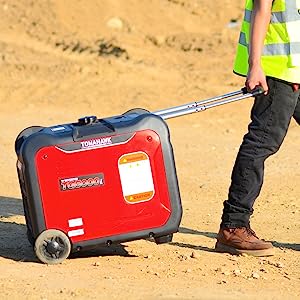In off-grid and remote areas, where access to a reliable power grid is limited or nonexistent, generators emerge as lifelines of energy. These versatile machines provide essential power for a wide range of applications, from powering homes and businesses to supporting critical infrastructure. In this guide, we'll explore the crucial role that generators play in off-grid and remote areas, enabling communities and projects to thrive even in the absence of conventional power sources.
1. Powering Remote Homes
Off-grid homes, cabins, and remote residences rely on generators as primary sources of electricity. Generators ensure that residents have access to lighting, heating, refrigeration, and essential appliances, providing a comfortable and functional living environment even in the most remote locations.
2. Remote Agriculture and Farming
In remote agricultural settings, generators power equipment such as irrigation pumps, machinery, and barns. They play a crucial role in providing electricity for crop cultivation, livestock care, and processing activities, contributing to sustainable food production in remote areas.
3. Telecommunications and Connectivity
Remote areas often lack reliable telecommunication infrastructure. Generators are essential for powering cell towers, satellite communication systems, and internet connectivity equipment, enabling communities to stay connected with the rest of the world.
4. Mining and Resource Extraction
Mining and resource extraction operations frequently take place in remote locations. Generators provide power for drilling equipment, conveyors, crushers, and lighting, supporting efficient and safe operations in challenging environments.
5. Construction and Infrastructure Projects
Construction projects in remote areas require power for tools, machinery, and site lighting. Generators serve as temporary power sources, facilitating construction of infrastructure such as roads, bridges, and buildings in locations far from established power grids.
6. Research and Scientific Endeavors
Remote research stations and scientific expeditions rely on generators to power laboratory equipment, communication devices, and essential living facilities. These generators ensure that researchers can conduct studies and gather data in the most remote and pristine environments.
7. Disaster Relief and Humanitarian Efforts
Generators are crucial components of disaster relief operations and humanitarian efforts. They provide power for medical facilities, water pumps, shelters, and communication centers in areas affected by natural disasters or conflicts, ensuring that aid reaches those in need.
8. Conservation and Environmental Preservation
Remote areas often host conservation projects and wildlife protection efforts. Generators power monitoring equipment, research stations, and surveillance systems that aid in safeguarding fragile ecosystems and endangered species.
9. Remote Tourism and Eco-Lodges
Tourism and hospitality ventures in remote areas rely on generators to provide amenities such as lighting, hot water, and charging stations for guests. These generators contribute to sustainable tourism while preserving the pristine nature of the surroundings.
10. Energy Independence and Sustainability
In remote areas, generators often run on alternative fuels such as diesel, propane, or solar power. This not only reduces dependence on fossil fuels but also contributes to the establishment of sustainable and eco-friendly power solutions.
Generators are not just machines; they are the backbone of progress, safety, and connectivity in off-grid and remote areas. Their applications span across various sectors, providing power for homes, industries, infrastructure, and humanitarian efforts. As technology continues to advance, generators evolve to become more efficient, eco-friendly, and reliable, allowing remote areas to thrive and develop while staying connected to the world at large.










